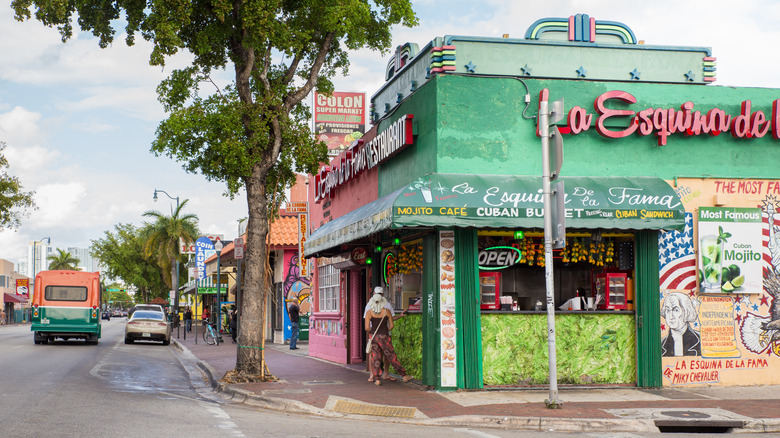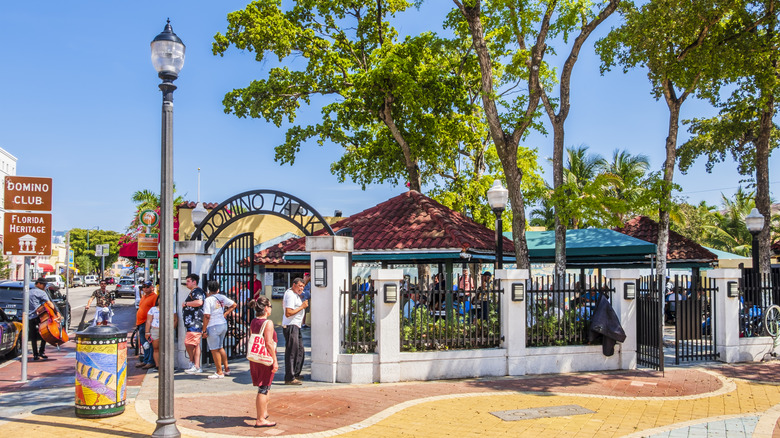South Florida Has A New Dialect. Here's What You Should Know
If you live in Miami, you may already speak an entirely new dialect of the English language, according to research conducted in 2023 by Florida International University. The development of the new dialect relates primarily to calques — a linguistic term sometimes called a loan translation, meaning when two different languages blend, in Florida's case, Spanish and English, not in words borrowed wholesale, but in direct translations of phrases, among other subtle influences.
Examples of well-known calques include the English word skyscraper, translated directly to "cloud scraper" or "wolkenkratzer," in German rather than the German language adopting the entire word "skyscraper" itself, ThoughtCo. points out. That's opposed to loan words like "sushi," taken from Japanese to English, or "gazelle" lifted from Arabic, to mean the same thing (via Cambridge Dictionary).
Dandelion, from "lion's tooth" the Latin name for the flower, is another calque. In German, "lion's tooth" became "löwenzahn." And In French, "löwenzahn" was translated to "dent de lion, and finally, "dandelion" in English, all referencing the same flower.
In the case of the possible new South Florida dialect, certain calques or direct translations from Spanish to English were noticed among the large and diverse first and second-generation Spanish-speaking bilingual population. In Spanish, "bajar del carro," translates directly to "get down from the car," which, among other instances — like "married with" instead of "to" — are now said by many English-speaking Miami residents, linguists found.
Semantic and phonetic calques have also emerged
In addition to "literal lexical calques" — such as "make a party" instead of have or throw a party, based on "hacer una fiesta" meaning the same thing in Spanish — FIU researchers found semantic and phonetic calques among some third and fourth-generation English speakers in a possible new English dialect, Florida International University sociolinguist, Philip M. Carter, who was involved in the research, wrote in Scientific American.
A semantic calque is another example of how one language can influence another — this time not in a literal translation, but instead, borrowed meaning. For example, in Spanish "carne" can mean both beef and meat in general, and FIU researchers found that among English speaking Miami residents, beef is now sometimes referred to as "meat," while other types of meat such as chicken or fish are called by those names, instead.
A phonetic calque, on the other hand, relates to the influence of certain sounds, as Carter points out. In Spanish, he writes, "gracias a Dios" — notice the "s" sound at the end of gracias — means "thank God," and in South Florida, the "s" at the end of gracias remains, turning "thank God" into "thanks God." Speaking with FIU News, Carter said, "This shows Miamians assess certain phrases differently and don't see some examples as 'ungrammatical.' So, those are the ones that are passed down. This is how dialects are born. Minor things add up."
Study participants ranked 50 sentences
To reach their conclusions that a new English dialect may have birthed in South Florida, researchers asked Miami-area residents and others English speakers from throughout the country to rate 50 sentences including calques so far outlined. Miami locals — even those with no connection to the Latin community in the area — rated the examples acceptable, while those who were not from the area felt they sounded awkward or possibly grammatically incorrect.
Further research is required to determine if in fact there's an entirely new type of English dialect in South Florida, but FIU sociolinguist Philip M. Carter who along with Kristen D'Alessandro Merii of the University at Buffalo, was involved in the research, told NPR that dialects amount to not much more than that: A remarkable similarity between languages spoken across regions, with a few distinct aspects of the local language seeming "off" to those from outside the area.
What's more, the proposed new English dialect in South Florida seems to be spreading, Carter told NPR. "[W]e know that children and grandchildren tend to be bilinguals," he added. But Carter and Merrii found, "anecdotal evidence that these forms are seeping out of that community into the general South Florida, Miami, English speech community and are being used by non-Spanish speakers, non-Latinxes, non-Cubans as well," Carter said.


